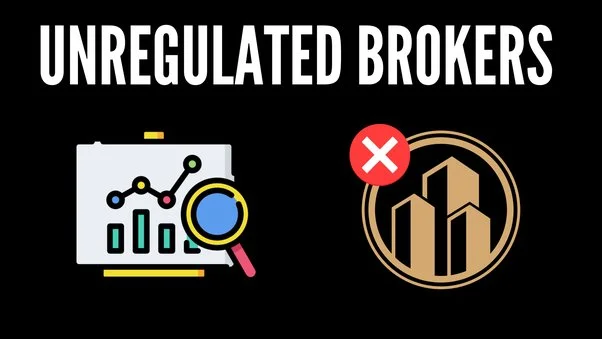A financial intermediary or business that provides brokerage services in the financial markets without the requisite licences or monitoring from regulatory authorities is referred to as an unregulated broker, sometimes known as an unregistered broker or an unlicensed broker. These brokers operate outside of the regulatory framework set up by governmental organisations or financial watchdogs in charge of monitoring, ensuring, and protecting investors and the integrity and fairness of the financial markets. The following are some crucial ideas to comprehend regarding unregulated brokers:

- Lack of Oversight: Unregulated brokers are exempt from the norms, guidelines, and restrictions set forth by regulatory organisations, which can change from nation to country. This implies that they are not subject to the same standards of disclosure, reporting, and investor protection as licenced brokers.
- Risk: Investors run a larger risk when working with unregistered brokers. Since there is no regulatory body overseeing their operations, there is a higher risk of fraud, improper handling of funds, and other unethical behaviour.
- Investor Protection: Regulatory organisations are in place to safeguard investors by upholding laws that encourage just and moral conduct in the financial sector. Investors who work with unregulated brokers may have little to no remedy in the event of disagreements, fraud, or financial losses.
- Due Diligence: Investors who are thinking about working with a broker should do extensive due diligence to confirm that the broker is licenced and regulated by the proper agency. Verifying the broker’s registration, looking over their financial accounts, and looking for any disciplinary proceedings or complaints are all part of this process.
- Legal Consequences: In many places, it is frequently unlawful to operate as an unlicensed broker. Legal action may be taken by the authorities against unlicensed brokers who engage in financial operations.
- Complex or risky investment products may be offered by unregulated brokers, who are not suitable for all investors. Investors might be exposed to investments with inadequate disclosure or false information if there is no regulatory monitoring.
- Absence of Investor Protections: Regulatory bodies frequently offer safeguards like insurance on deposits or compensation funds in the event that a regulated broker experiences financial difficulties. When working with brokers who are not regulated, these protections might not be available.
In conclusion, unregulated brokers are financial intermediaries that operate outside of the control and permission of regulatory bodies. When considering working with such brokers, investors should proceed with the utmost caution as they may be exposed to greater risks and lack legal protections. To provide a higher level of safety and investor protection in the financial markets, it is generally advised to pick regulated and licenced brokers.
Advantages and Disadvantages Unregulated Broker
Advantages
- Lower expenses: Because they are not burdened by the compliance expenses associated with regulatory oversight, unregulated brokers may be able to provide lower fees and commissions. Investors and traders who are cost-conscious may find this appealing.
- Flexibility: Since unregulated brokers are not subject to tight regulatory requirements, they may offer more flexibility in terms of trading methods, leverage, and investment alternatives.
- confidentiality: Since unregulated brokers may not need a lot of personal information and documents, some investors appreciate the confidentiality that they provide.
- Access to Distinctive Markets: Unregulated brokers may provide access to markets or assets that are difficult to obtain through regulated brokers, thereby opening up options for diversification.
DisAdvantages
- Lack of Investor Protection: The absence of investor protection is the main drawback of unregulated brokers. Investors may have few options and be ineligible for reimbursement or insurance coverage if something goes wrong.
- Higher Risk of Fraud: Since unregulated brokers are not subject to regulatory oversight, they are more vulnerable to fraudulent activities like frauds, Ponzi schemes, and the theft of funds.
- Lack of Oversight: Unregulated brokers operate without supervision, making it challenging to guarantee honest and open business practises. Price manipulation and unethical behaviour may result from this supervision gap.
- No protection for client funds: Regulated brokers are frequently required to keep client funds separate from their operational accounts, adding an extra layer of security in case the broker runs into trouble financially. This protection may not be provided by unregulated brokers.
- Potential for Unfair Practises: Unregulated brokers may use unethical tactics like front-running (trading before being aware of client orders) or giving false information without worrying about facing legal repercussions.
- Legal Risks: Investors who work with unregulated brokers run the risk of unwittingly being involved in unlawful operations, which could put them at risk for legal problems.
- Limited Transparency: Compared to regulated brokers, unregulated brokers might not be as transparent about their financial standing, order execution procedures, and trading circumstances.
Conclusion
In the financial industry, selecting between working with registered and unregulated brokers requires thorough assessment of the benefits and drawbacks of each choice.
Regulated Brokers:
- provide more investment safety through regulatory control.
- are required to adhere to strong compliance guidelines and transparency norms.
- Offer protections for customer money, such as account segregation.
- have a lesser likelihood of fraud and unethical behaviour.
- For the majority of investors, are typically a safer option, especially for those looking for long-term financial security and adherence to established norms and regulations.
Unregulated Brokers:
- may provide more trading freedom and cheaper costs.
- can grant access to exclusive markets or resources and anonymity.
- Possibly appealing to seasoned traders who feel comfortable taking on bigger risks.
- expense of regulatory compliance is less onerous.
FOR MORE INFO CLICK THIS SITE:https://learningsharks.in/
FOLLOW OUR PAGE:https://www.instagram.com/learningsharks/?hl=en
